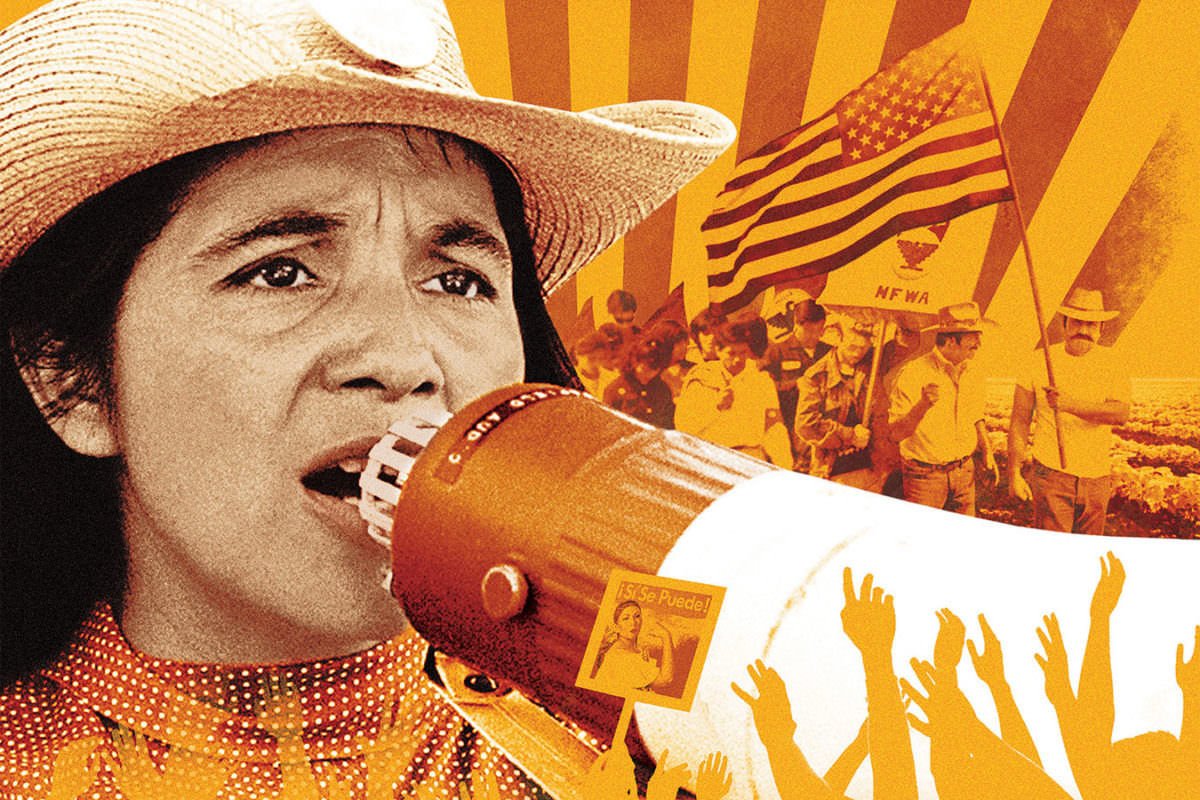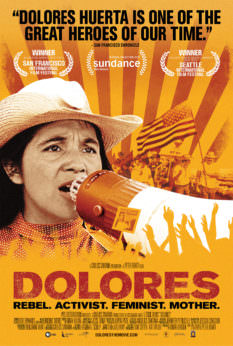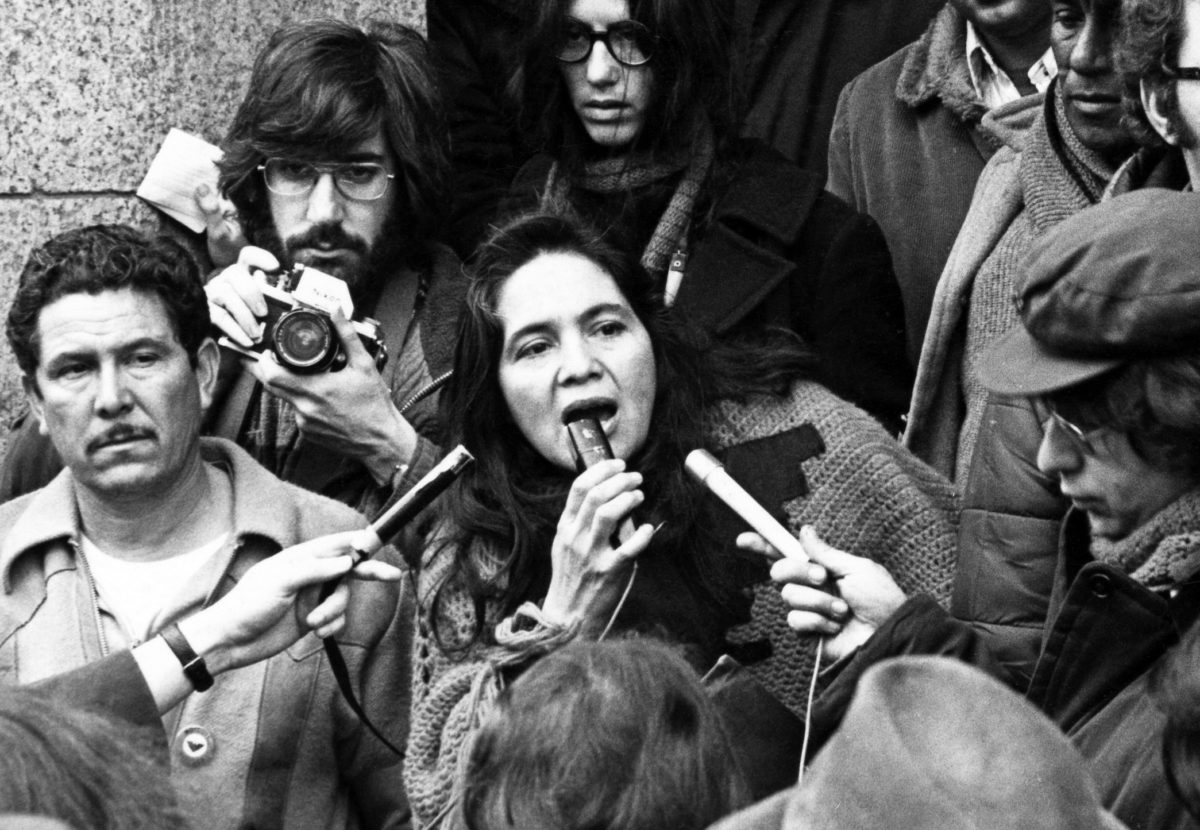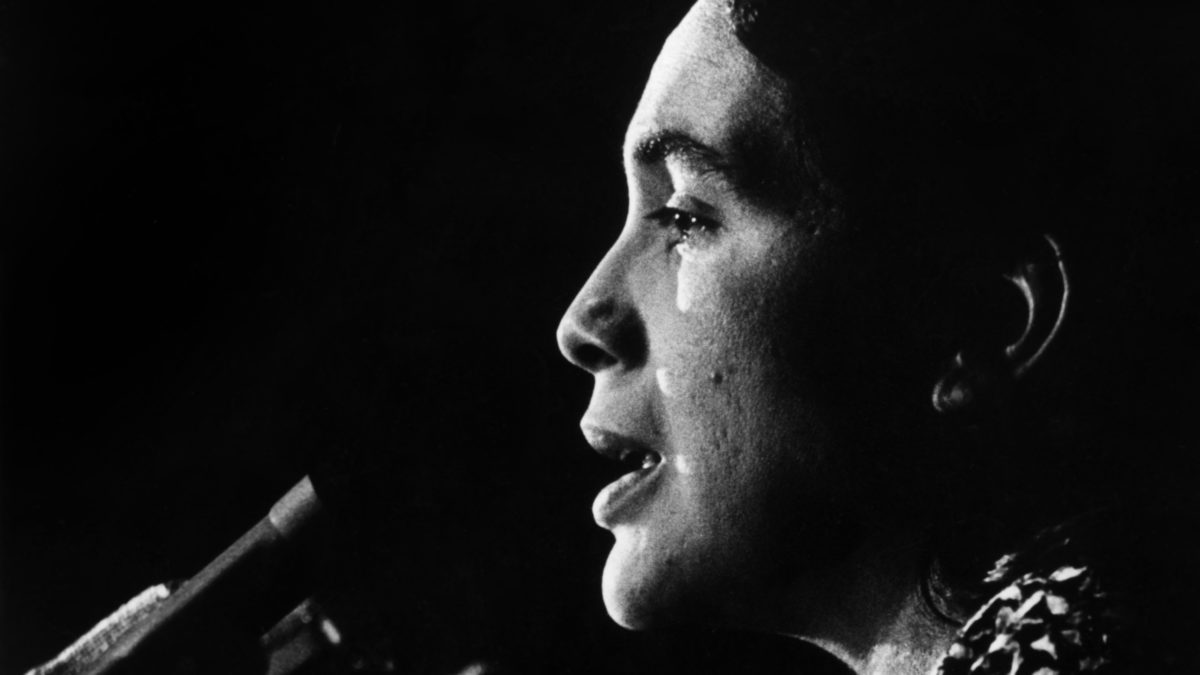Dolores Huerta: A Hero of the Farmworker Movement Finally Gets Her Due
A new film re-writes the history books on farmworker justice – and places this 87-year-old saint next to Cesar Chavez, where she belongs.
Dolores Huerta: A Hero of the Farmworker Movement Finally Gets Her Due
A new film re-writes the history books on farmworker justice – and places this 87-year-old saint next to Cesar Chavez, where she belongs.

Hoping to right that wrong, rock n’ roll icon and Latino activist Carlos Santana approached San Francisco filmmaker Peter Bratt about making a documentary on Huerta’s life. That was four years ago. The resulting film, Dolores, of which Santana is the executive producer, debuted at the Sundance Film Festival in January. After picking up several awards on the film festival circuit, it hits theatres nationwide this month.

“Hatred and racism are extensions of violence,” says a younger Huerta in one of the film’s many archival clips. “If we become that which we are trying to end, then we are becoming like the oppressor.”
“Dolores was very gracious when I told her I had stolen her slogan. I’m pleased she let me off easy, Dolores does not play.” – Barack Obama
The film dives deep into the lives of those Huerta touched and transformed – farmworkers, but also Americans of all stripes who were involved in the civil rights movement and looked to her as a role model. Her complex personal life, which was often at odds with her activism, is also a central part of the narrative. The filmmakers’ extensive interviews with Huerta’s children provide a window beyond the faÁ§ade of this seemingly tireless activist and into the strained daily existence of a mother of eleven, who was at times unable to provide for neither the physical nor emotional needs of her kids.
A parade of prominent figures throughout the film testify to Huerta’s influence as a spokesperson for the oppressed. Feminist activist Gloria Steinem, Huerta’s longtime friend, and others make the case that she is not only missing from history books as a leader of the farmworker’s movement, but as an icon of the women’s movement. Bobby Kennedy, widely known for his support of Cesar Chavez, is portrayed as having had a much closer relationship with Huerta, who was by his side when the young Senator was assassinated in Los Angeles during his 1968 presidential run.

Hillary Clinton makes a short appearance in the film, as does Barack Obama. “Yes we can!” – the rallying cry of President Obama’s 2008 campaign – is the English translation of the United Farm Workers slogan, ¡SÁ, se puede!. Chavez is frequently attributed with coining the phrase, but the words were in fact Huerta’s. “Dolores was very gracious when I told her I had stolen her slogan,” Obama acknowledges in footage of him awarding her the Presidential Medal of Freedom in 2012. “Knowing her, I’m pleased she let me off easy, because Dolores does not play.”
Huerta, now 87, is still not messing around with her mission of empowerment. She moved on from the UFW after Chavez’s death in 1993 to found the Dolores Huerta Foundation, which provides leadership training in the grassroots style of activism she helped to pioneer. Huerta travels throughout the country spreading her message, but continues to focus most of her efforts in the Latino agricultural communities of the California’s Central Valley. Modern Farmer recently had the opportunity to ask her a few questions about the film and her thoughts on the state of the farmworker movement today.
This interview has been edited and condensed for clarity.
Farmworkers are the most degraded, debased, denigrated people, and you see how they overcame the biggest powers of the country.
Modern Farmer: Given the renewed intensity of racist hatred and the denigration of immigrants in this country, the timing of Dolores couldn’t be better. We’re coming up on nearly a year since the election of Donald Trump – what’s the tone of conversations in the Latino farmworker community today?
Dolores Huerta: People are very much afraid. There is so much fear when you have families being separated. It’s not a crime to cross the border. It is a civil offense. By crossing the border you’re not hurting anybody, but it’s now treated like a criminal offense when they deport people. There are bills in Congress right now to triple the penalties, so people can be kept in jail for a long time just because they crossed the border. Legalization has been part of the immigration system in this country ever since the country was formed by immigrants centuries ago. But now we have these archaic laws that penalize immigrants, which is so wrong. It’s very inhuman. [Editor’s note: This interview was conducted before Trump’s decision to end DACA.]
MF: Have you found there is a renewed level of intensity and focus in the activist community you’re a part of since Trump was elected?
DH: There really is. We do a lot of work at the foundation around civic engagement, getting people to run for office, voter registration, healthcare, education. The immigrant community really wants to participate. We just settled a big lawsuit against a local high school district about the suspension and expulsion of Latino and African-American children – we’re trying to stop the school-to-prison pipeline. We are very, very busy. We’re hoping that the movie will inspire even more people to get engaged at the local level.
I think in the future women are going to be recognized for the work that they do more than we have been in the past.
MF: Those close to you have long understood your legacy and influence in the farmworker movement, so why is this film just now being made? Why is Cesar Chavez the face of the UFW, and not Cesar Chavez side-by-side with Dolores Huerta?
DH: I think that is the issue that made Carlos Santana want to make this movie. He felt that I wasn’t given enough credit. But I believe that the credit belongs to all the people that marched, all the people that went to jail, the people that participated in the boycotts. And the martyrs – Nan Freedman, Nagi Daifallah, Juan de la Cruz, Rufino Contreras, Rene Lopez – all the people that have been killed during farmworker movement. I think they are the ones who should be recognized.
There is a reason we call it history, not herstory. I think that is gradually changing, especially after the great women’s march that we had recently. I think in the future women are going to be recognized for the work that they do more than we have been in the past.
MF: Did you take part in the women’s march in January?
DH: I did. It happened to be during [the premier of Dolores at] the Sundance Film Festival, so we had a women’s march at Sundance.
MF: What was it like for you personally to make the film?
DH: I think the story is very relevant in terms of what is happening in today’s world. What I liked most about the film is that it shows the power of poor people. Farmworkers are the most degraded, debased, denigrated people, and in the film you see how they overcame the biggest powers of the country at that time – the president of the United States, Richard Nixon; the governor of California, Ronald Reagan; and the American Farm Bureau Federation, which is the most powerful grower organization. These poor farmworkers were able to overcome all that, with the help of the American public. I think that is the message that we need in today’s world: when people step up, they can make a great difference in what happens in our United States of America.
With all the money they’ve spent fighting a union contract, they could have increased the workers wages, contributed to a pension plan, and improved their medical plan.
MF: How do you connect that history with the situation of farmworkers today? Several major victories were achieved in the early days of the UFW, but there are still very few labor agreements for farmworkers, and abysmal working and living conditions are still commonplace.
DH: That is true. In California, we won the right to organize, which farmworkers didn’t have – but throughout the rest of the United States farmworkers still do not have the right to organize. We also have many of the same problems with pesticides. Just recently a large number of farmworkers in California were poisoned with pesticides – it was one of the pesticides that President Trump just took off the restricted list.
MF: Clearly, policy matters have not advanced much, but in terms of public awareness of these issues it almost seems that we’ve moved backwards since the sixties and seventies.
DH: One area where there is now much more public awareness is around the quality of food, which is part of the big growth in organic farming. So I think the public is starting to realize that farmers and workers need to be protected at the source of our food where comes out of the ground.
MF: What issues within the farmworker community do you wish had more recognition?
DH: The growers are constantly fighting to prevent labor protections and union contracts. There is one grower, Gerawan, which I helped organize against 20 years ago, that we still haven’t been able to get a labor contract with because they’re still fighting it in court. With all the money they’ve spent fighting a union contract, they could have actually increased the workers wages, contributed to a pension plan, and improved their medical plan. Yet they would prefer to spend that money to fight the union. So it’s been a long, long, long battle.

MF: Do you see any sort of silver lining in the Trump presidency for immigrant farmworkers? Perhaps we will look back and see this as the moment that finally catalyzed a more humanitarian, and pragmatic, approach to immigration reform.
DH: Hopefully we have enough pressure now on our president that he will start changing his views, especially toward Mexicans. They are deporting a lot of undocumented farmworkers, and then crying ‘labor shortage’. They want to bring in more contract [H-2A visa] workers, who will never be able to get unemployment insurance, Social Security benefits, or the right to be a resident or a citizen of the United States of America – it’s a step above slave labor.
Though Senator Diane Feinstein, who is a great asset in Congress, has proposed a bill for what she calls a blue card, which would allow undocumented farmworkers to stay here as long as they are working. It is limited in terms of what they can do, but they would be protected and would not be deported.
Visit www.doloresthemovie.com to learn more about the film and to find a screening near you.
SaveSave
Follow us
This work is licensed under a Creative Commons Attribution-NoDerivatives 4.0 International License.
Want to republish a Modern Farmer story?
We are happy for Modern Farmer stories to be shared, and encourage you to republish our articles for your audience. When doing so, we ask that you follow these guidelines:
Please credit us and our writers
For the author byline, please use “Author Name, Modern Farmer.” At the top of our stories, if on the web, please include this text and link: “This story was originally published by Modern Farmer.”
Please make sure to include a link back to either our home page or the article URL.
At the bottom of the story, please include the following text:
“Modern Farmer is a nonprofit initiative dedicated to raising awareness and catalyzing action at the intersection of food, agriculture, and society. Read more at <link>Modern Farmer</link>.”
Use our widget
We’d like to be able to track our stories, so we ask that if you republish our content, you do so using our widget (located on the left hand side of the article). The HTML code has a built-in tracker that tells us the data and domain where the story was published, as well as view counts.
Check the image requirements
It’s your responsibility to confirm you're licensed to republish images in our articles. Some images, such as those from commercial providers, don't allow their images to be republished without permission or payment. Copyright terms are generally listed in the image caption and attribution. You are welcome to omit our images or substitute with your own. Charts and interactive graphics follow the same rules.
Don’t change too much. Or, ask us first.
Articles must be republished in their entirety. It’s okay to change references to time (“today” to “yesterday”) or location (“Iowa City, IA” to “here”). But please keep everything else the same.
If you feel strongly that a more material edit needs to be made, get in touch with us at [email protected]. We’re happy to discuss it with the original author, but we must have prior approval for changes before publication.
Special cases
Extracts. You may run the first few lines or paragraphs of the article and then say: “Read the full article at Modern Farmer” with a link back to the original article.
Quotes. You may quote authors provided you include a link back to the article URL.
Translations. These require writer approval. To inquire about translation of a Modern Farmer article, contact us at [email protected]
Signed consent / copyright release forms. These are not required, provided you are following these guidelines.
Print. Articles can be republished in print under these same rules, with the exception that you do not need to include the links.
Tag us
When sharing the story on social media, please tag us using the following: - Twitter (@ModFarm) - Facebook (@ModernFarmerMedia) - Instagram (@modfarm)
Use our content respectfully
Modern Farmer is a nonprofit and as such we share our content for free and in good faith in order to reach new audiences. Respectfully,
No selling ads against our stories. It’s okay to put our stories on pages with ads.
Don’t republish our material wholesale, or automatically; you need to select stories to be republished individually.
You have no rights to sell, license, syndicate, or otherwise represent yourself as the authorized owner of our material to any third parties. This means that you cannot actively publish or submit our work for syndication to third party platforms or apps like Apple News or Google News. We understand that publishers cannot fully control when certain third parties automatically summarize or crawl content from publishers’ own sites.
Keep in touch
We want to hear from you if you love Modern Farmer content, have a collaboration idea, or anything else to share. As a nonprofit outlet, we work in service of our community and are always open to comments, feedback, and ideas. Contact us at [email protected].by Brian Barth, Modern Farmer
September 18, 2017
Modern Farmer Weekly
Solutions Hub
Innovations, ideas and inspiration. Actionable solutions for a resilient food system.
ExploreExplore other topics
Share With Us
We want to hear from Modern Farmer readers who have thoughtful commentary, actionable solutions, or helpful ideas to share.
SubmitNecessary cookies are absolutely essential for the website to function properly. This category only includes cookies that ensures basic functionalities and security features of the website. These cookies do not store any personal information.
Any cookies that may not be particularly necessary for the website to function and are used specifically to collect user personal data via analytics, ads, other embedded contents are termed as non-necessary cookies.